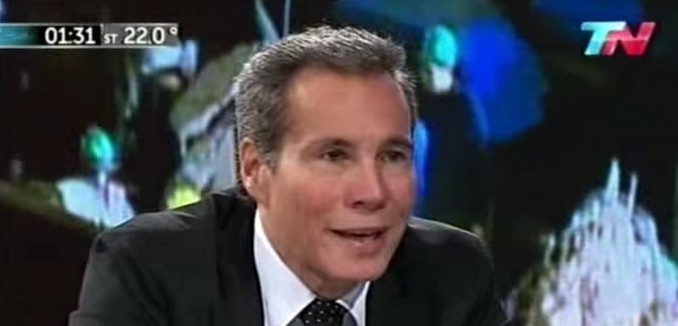The sense of shock arising from the mysterious death of State Prosecutor Alberto Nisman on Sunday has reverberated across Argentina and the entire world. His death—the latest tragic development in a case that has yet to secure a single conviction, more than twenty years after the AMIA Jewish community center in Buenos Aires was destroyed in a bomb attack that murdered 85 people—was discovered hours before he was due to appear before a congressional committee. Nisman was going to present new evidence that President Cristina Fernández de Kirchner and Foreign Minister Héctor Timerman used illegal back-channel negotiations to deliberately cover up Iran’s involvement with the AMIA bombing, the worst anti-Semitic atrocity since the Second World War, in exchange for improved commercial relations between the two countries.
In the midst of the ongoing confusion about the exact circumstances in which Nisman’s life ended (Fernández de Kirchner has admitted that it was not a suicide, as authorities originally claimed), and a growing sense of political crisis, a few things seem clear:
1. The death of Nisman has to be seen in the context of a shift in government policy towards Iran that can be dated back to the appointment of Héctor Timerman as Foreign Minister in June 2010. The motivations behind this shift have yet to be fully accounted for, but seem likely to be related to Timerman’s personal ambitions and Fernández de Kirchner being both less naturally cautious and more permeable to the anti-Western discourse of some of their supporters than was her late husband and predecessor in office, Néstor Kirchner. Reading between the lines in the very first interview he gave to the press after his appointment, it’s clear that Timerman saw Nisman’s request for the arrest of a number of senior Iranian officials in connection with the atrocity as an obstacle to the development of bilateral relations which he was anxious to overcome. While he insisted that Argentina would persist with its demand for the extradition of the wanted men, he also spoke of Argentina’s justice system as if it were that of a foreign country, noting that the judiciary only “says” it has evidence against the wanted Iranians. Critically, he concluded the following about the AMIA case: “Since 2003 the government has decided to accompany the demands of the justice system. We are not going to take any other path. We are not going to support the taking of any other path.” The message to Iran’s rulers could not have been clearer: We are going to continue make the ritual annual demand for the extradition of the suspects at the UN General Assembly, but apart from that, you guys can relax. We are not going to break diplomatic relations, and we won’t use our influence on multilateral bodies or with our allies to put pressure on you.
2. The shift towards Iran reached its climax in early 2013 with the sealing of a shameful—and up to now, inexplicable—pact with Iran to jointly investigate the murder of the dozens of Argentine citizens killed in the AMIA attack. To get a sense of how outrageous this was, imagine the United States setting up a joint commission with the Taliban to investigate the 9/11 attacks, with the entire investigation to be carried out under their supervision in Kabul.In Argentina, the pact was quickly ruled unconstitutional and the Iranians themselves lost interest in ratifying it. Thanks to Nisman’s investigations, we now know why: All that the Iranians were really interested in was the dropping of the international arrest warrants against their officials. When it became clear that this was not in the gift of the Argentine government, they declined to pursue the matter any further.
3. More than 20 years after the AMIA massacre, and after the expenditure of vast amounts of public money, we are farther away than ever from convicting the principal authors of the attack. Carlos Telleldín, a secondary, local participant, is to be retried for his role in providing the vehicle the attackers used to carry the bomb; that’s about as positive as the news gets. Such credibility as the government had with regard to the investigation has been destroyed by Nismans’s death. It’s hard to see how anyone they appoint to replace him can have the slightest prospect of effectively doing their job. What could the government say to even persuade anyone credible to take the job, given the circumstances of Nisman’s death?
Finally, we who live in Argentina are filled with an enormous sense of sadness and rage. We have to try to come to terms with the fact that that we live in a country where a state prosecutor can die in mysterious circumstances just days after making grave accusations against the President and Foreign Minister. The reaction from the authorities has been bluff and bluster. In the case of the President, she released one rambling missive long on conspiracy theories and personal reminiscence, and short on compassion and the taking of effective measures to restore public confidence in the administration of justice. Now she’s produced another—equally self-referential and bizarre in tone—in which she suggests that Nisman was murdered on the instructions of his foreign masters in order to create a scandal damaging to her and to her government.
The coming days will tell us whether we live in a democracy—flawed but a democracy nonetheless—or a mafia state where local and foreign intelligence services do their grim work with the connivance of the highest authorities in the land—and where Jewish citizens can be slaughtered with almost no one being called to account.
For a more thorough look at the history of the AMIA attacks and Argentina’s shameful refusal to bring its perpetrators to justice, read Has Argentina Turned Against Its Jews?, written by the author for the October 2014 issue of The Tower Magazine.
[Photo: Danilo Gonzales / YouTube ]




